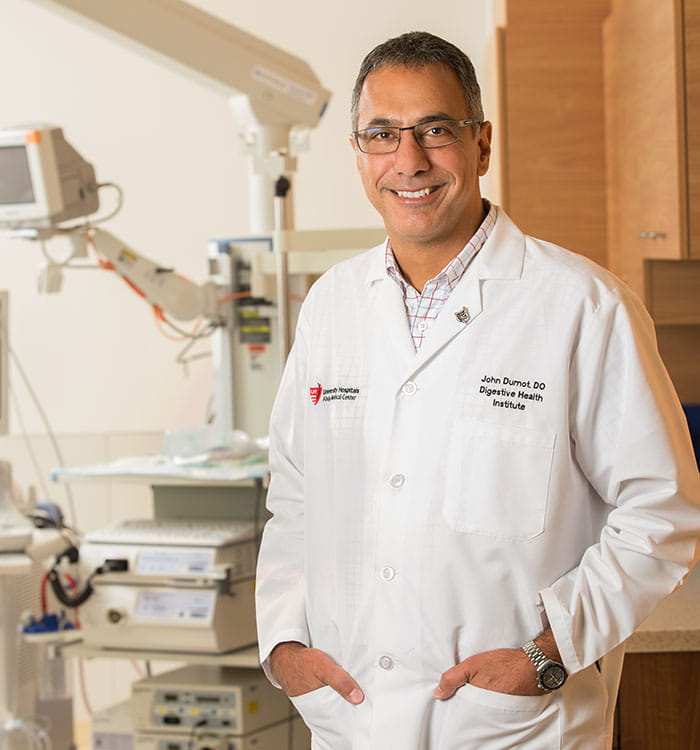UH Digestive Health Institute Update
November 27, 2022
Innovations in Digestive Health |Fall 2022
A recent editorial in the New England Journal of Medicine has garnered much media attention. The article’s authors discuss the Nordic-European Initiative on Colorectal Cancer (NordICC) trial and its implications on the real-world effectiveness of colonoscopy. While headlines focusing on the study’s findings seem to call into question colonoscopy’s role in reducing cancer rates and deaths, they overlook significant details.
The NordICC researchers looked at 85,000 people living in four European countries. One-third of the subjects received a letter inviting them to have a colonoscopy; two-thirds received no screening. The study found that the treatment group had an 18 percent lower colon cancer risk and no significant reduction in risk of death from colorectal cancer over a 10-year period.
However, a closer look at the research findings shows that less than half (42 percent) of the people invited to receive a colonoscopy chose to have one. In an adjusted analysis of the individuals who opted for screening, the risk of developing colorectal cancer decreased by 31 percent. Additionally, their risk of dying from colorectal cancer decreased by 50 percent.
The concept of intention-to-treat in a prospective randomized study holds that all participants are analyzed according to their original assigned group, regardless of whether they received treatment. But the challenge is that when the population at large looks at those numbers, people doubt the efficacy of their personal colonoscopy. A thoughtful reading of this and prior studies shows that colonoscopy decreases your chances of developing or dying from colorectal cancer.
Polyp Detection is Critical
A second factor influencing the NordICC trial was provider proficiency. Endoscopists with a higher adenoma (polyp) detection rate (ADR) better protect patients from future risk of colorectal cancer and death. Nearly 30 percent of the endoscopists in the NordICC trial had an ADR below the acceptable threshold of 25 percent. We know from previous studies that physicians who have higher ADR have patients who are at lower risk of contracting or dying from colon cancer.
University Hospitals is the first healthcare system in Ohio to offer artificial intelligence (AI) capabilities to enhance colonoscopy screening via Medtronic’s GI GeniusTM Intelligent Endoscopy Module. The module’s sophisticated pattern recognition algorithms are like a second set of eyes, classifying tens of thousands of images gathered during a typical 30-minute colonoscopy and flagging areas of concern. Adding this layer of polyp detection provides a sense of reassurance to physicians and patients. The novel technology is a game-changer that will likely become universal in the future.
Strain Continues on Healthcare Resources
We remain in an unprecedented time of resource and financial pressure in healthcare. The Omicron variant of COVID-19 caused another wave of personnel shortages and service slowdowns. We continue to triage patients based on their level of need to help those who are at greatest risk. For patients concerned about the pandemic and leery of coming in for colonoscopy, we have relied heavily on stool-based colon cancer screenings such as Cologuard® or the fecal immunochemical test (FIT) that can be completed in the comfort and privacy of home. Additionally, insurance carriers have removed restrictions that limited screening colonoscopies after a positive at-home test, improving access and affordability for patients.
While we continue to offer many screening colonoscopies, from a resource utilization perspective, healthcare systems will increasingly need to rely on stool tests as the first line of preventive care. Currently, one patient is flagged for every seven patients who undergo stool-based screening. If we can offer patients without symptoms or family history the option of in-home testing, we can target available resources to provide better follow-up for patients with known polyps or diagnose patients coming to us with new or concerning symptoms.
About Our People
Congratulations to Jennifer Miller-Ocuin, MD, who received the Research in Methodology Training Award from the American Society of Colon and Rectal Surgeons Research Foundation.
We warmly welcome this year’s newly hired physicians to the UH Digestive Health Institute:
Carine Bou-Abboud Matta, MD | Dr. Bou-Abboud Matta is a specialist in consultative gastroenterology at UH Cleveland Medical Center and is a leader for our electronic medical record (EMR) transition to Epic.
Zachary Kwasnicka, DO | Dr. Kwasnicka is the Medical Director at UH Portage Medical Center and a specialist in general gastroenterology.
Omar Sadiq, MD | Dr. Sadiq is a therapeutic gastroenterologist at UH Parma and UH St. John Medical Centers specializing in endoscopic retrograde cholangiopancreatography (ERCP) and endoscopic ultrasound (EUS).
Linden Karas, MD | Dr. Karas is a bariatric surgeon at UH Geauga Medical Center specializing in metabolic foregut surgery.
Saleem Chowdhry, MD | Dr. Chowdhry is the Medical Director at UH St. John Medical Center and a specialist in general gastroenterology.
Andrew Catanzaro, MD | Dr. Catanzaro is a therapeutic gastroenterologist at UH Cleveland Medical Center and UH Ahuja Medical Center specializing in ERCP and EUS.
To learn more or to seek a physician consultation with the UH Digestive Health Institute, call 216 553-1976.
 John Dumot,DO, FAGE
John Dumot,DO, FAGEContributing Expert:
John Dumot, DO, FASGE
Director, University Hospitals Digestive Health Institute
University Hospitals Cleveland Medical Center
Professor
Case Western Reserve University School of Medicine


